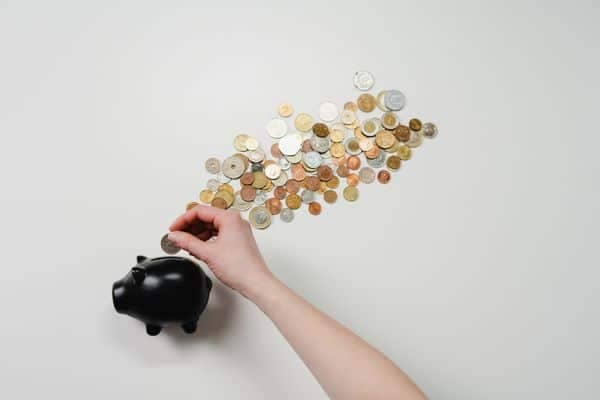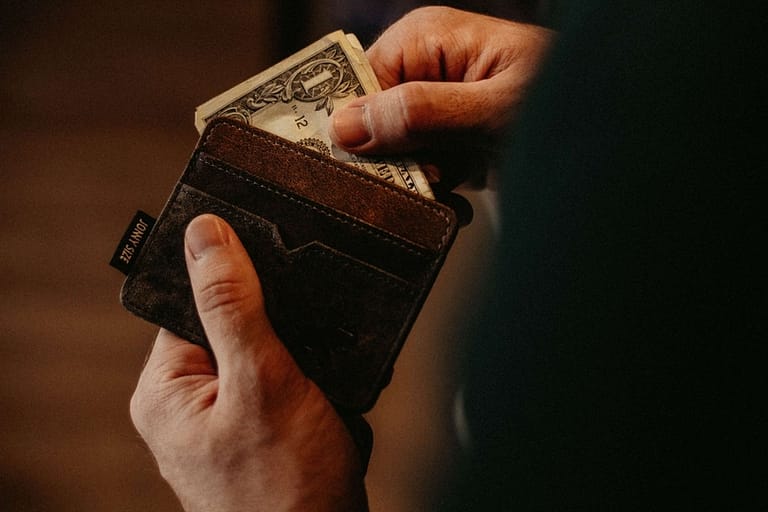Eat Organic Food On A Budget (12 Best Tips)
Disclosure: This post may contain affiliate links and if you choose to sign up or purchase a product/service through our links we may receive a commission at no cost to you. Please read our full privacy policy for more information.
If you are trying to be healthy and save money, you will find it tough to eat organic food on a budget.
As the cost of living rises, buying and eating organic food may feel like a pipe dream.
We all want to eat healthily, knowing that healthy and nutritious food is the best way to be kind to our bodies, choosing organic is one of the best ways to avoid additives and harmful pesticides.
However…
The big downside of eating organic is the cost! No, you shouldn’t just stop being healthy because of the price but find ways to lower the costs.
Here are the best ways to eat organic food on a budget…
Choose The Right Stores

One of the best ways to eat organic food on a budget is to make sure you shop at the right stores.
When trying to find cheap, organic food, the store where you buy your food makes all the difference in the world.
For example, a store that offers many services, such as packing your groceries, in-house prepared foods for you to buy, or even fancy non-food items, otherwise known as frills.
All of these frills come at a cost, which means the store needs to raise the cost of the groceries to ensure they can afford the little extra luxuries of their store.
So, if you want to find organic food at a lower cost, select a store that offers minimal services, that is, groceries, and that’s all.
Look around online to see the different prices for the items you usually purchase, and then compare the other stores to decide on the best option.
Consider Purchasing Frozen Organic Items
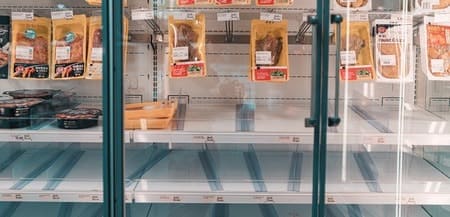
Organic frozen food is just as nutritious as organic fresh food.
It is flash-frozen within hours of being picked from the fields and is ready to use once you purchase and take it home.
The options are varied, from fruit and vegetables to cheap, organic meals.
Plus, you don’t risk it going bad in your refrigerator if you forget to use it right away, and you can use it for multiple cheap, healthy meals.
Consider making smoothies, soups, and stir-fry recipes, all with a delicious array of healthy, organic food ready to be added to your meal straight from your freezer.
I know it’s not the same as fresh food, but frozen foods are a great option if you want to eat organic food on a budget!
Save Money By Staying Away From Name Brands
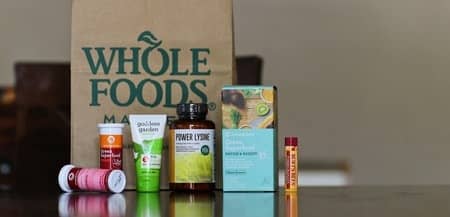
It is easy to believe that the brand of a bottle of ketchup describes the quality of the contents within.
But, if you compare the ingredients from a no-name brand to a well-known brand-name product, you’ll find that there really isn’t much difference except the order of the ingredients listed.
Next time, try buying a no-name brand of your favorite organic condiments. Sometimes, the store will have a considerably cheaper proprietary product than you would typically buy.
I have saved a lot of money over the years on organic products like oatmeal, rice, frozen entrées, and the like by opting for the store-brand product.
It’s definitely worth a shot to save money!
Buy In Season, Buy Local, and Learn To Preserve
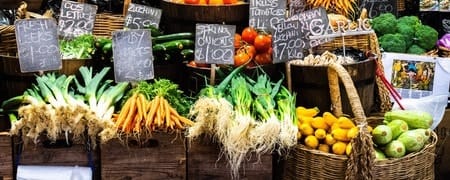
If you are a stickler for buying fresh, then learn to identify what vegetables and fruits are available at what time of year.
Many people love to go to a farmer’s market and buy all the local organic food, which is less expensive since it comes from local farms and is in season.
Eating healthy on a budget is much more attainable when you aren’t trying to buy fresh organic corn in the middle of winter or adversely organic squash in the springtime.
You can also choose to stock up on these fresh organic finds and preserve your foods by freezing them or preserving (think canning or pickling) them to eat at a later date.
This is one of the best tips to eat organic food on a budget due to simple supply and demand!
If you purchase items based on their seasonality, then you will save a lot of money!
Plant Your Own Vegetables and Fruits
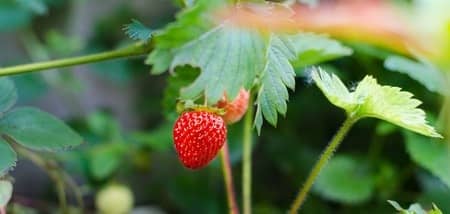
Whether you have a backyard space, a balcony, or a tiny bit of free space in your kitchen, you can plant your own fruit and vegetables from organic seeds for some great, cheap, organic food.
And don’t think that a garden will only grow when it’s warm outside; plenty of plants also like the cooler weather.
Remember that every fruit and vegetable has its preferred season, so do your research and see what magic you can create in your own personal organic garden.
Know that if you really want your planted garden to be organic truly, select soil that is also organic and not full of unnecessary additives.
The same is true for any plant food you choose to add to your soil, try sticking to organic egg shells, fruit peels, and such to keep it all organic.
Of course, you can’t grow everything you need, but if you can produce a few things, you can save money easily!
Check Sales

When you are getting ready to make your grocery list for the week, look at the sales flyer for your store.
If there are good deals on certain fruits, vegetables, or unprocessed meats, make a note of it.
If the price is good enough to stock up on the item, then do so. Just ensure you have enough freezer space or that the food will get used before going bad.
If you throw it out, or it gets lost in the frozen tundra of your freezer, then it isn’t a good deal.
Grocery stores always offer deals, so if you opt for these deals instead of purchasing items wildly, you will save a lot of money!
Plan Your Meals
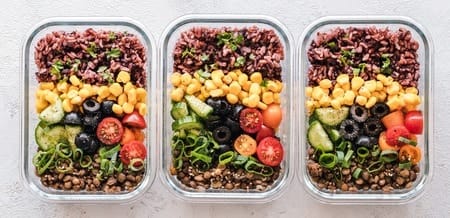
Meal planning is crucial in learning to eat organic food on a budget.
Take a look at foods that are on sale, then start planning your meals for the week.
Keep in mind that meat is often the most expensive ingredient of a meal.
If you can get meat on sale or plan meals to use plant-based protein sources, that will go a long way in saving money.
If you are a meat-centric family, try making one meatless dinner each week.
Try getting to a point where you do only 1-2 meals each week that include fish or meat.
This, combined with meal planning, will significantly impact your grocery budget.
Make A Grocery List
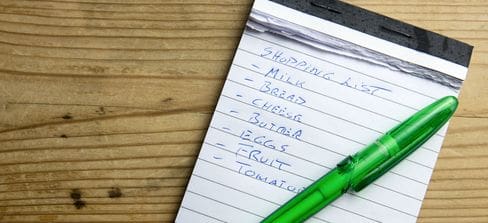
Making a grocery list is one of the easiest and most straightforward ways to eat organic food on a budget.
This should be done anytime shopping for groceries, not just purchasing organic food!
Take a look at the meals you plan to make and make your grocery list accordingly.
Go through your cupboards to see what ingredients you need to buy and what you already have.
Remember things like milk for cereal if needed and healthy snacks.
So many people purchase items they don’t need or really want and end up in the trash. It’s such a waste of money!
So, stick to a grocery list and only purchase food that you will actually finish!
Buy Whole Foods To Save Money
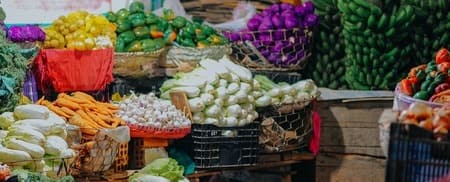
No, not Whole Foods, the grocery chain; let me explain…
Precut fruits and vegetables often cost more than purchasing them whole.
You can always purchase whole fruit and vegetables and then cut them up on your own, it won’t take much work, and you will save money!
The same goes for meats; precut and cleaned meat are pricier than purchasing whole meat or select cuts.
For example, purchasing precut boneless chicken is more expensive than a whole chicken.
It’s a simple tip to save you money, so consider it!
Freeze Meals For Later
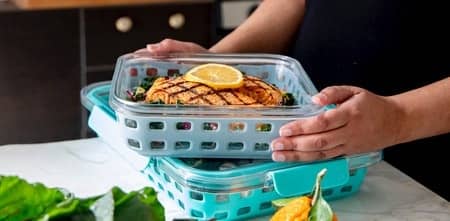
Many people have learned how to eat healthy on a budget by freezing meals for later.
We already discussed purchasing frozen items to save money, but you can also freeze food to make them last longer, saving you money.
You can make a double batch of your cooking meal and freeze leftovers for later.
Soups and casseroles are great for this, but you can also do it with homemade pasta sauces, fillings, or pre-cook meat to use later.
There are also freezer meal plans you can use, such as MyFreezEasy, that make planning healthy meals on a budget super simple and fast. Like, ten family meals in an hour fast!
It’s a straightforward tip that will save you time and money!
Eat More Organic Beans
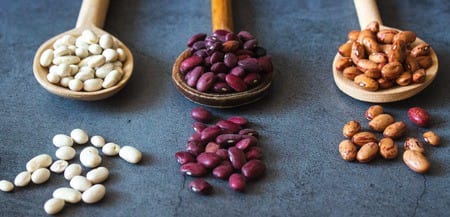
Organic meat is an expensive source of protein. Beans, however, are inexpensive and provide plenty of protein and fiber.
You can easily incorporate or substitute beans into your favorite recipes.
Try using beans in enchiladas, make an all-bean chili, or beans with pasta, or there are lentil meatloaf recipes.
Of course, organic beans are pricier than canned beans, but they are super healthy and much cheaper than meat.
By replacing meat with beans, you will find yourself saving more money!
Use Cash Back Apps To Save Money On Organic Food

Cashback apps are one of the easiest ways to eat organic food on a budget.
Cash back apps are simply apps that will give you money back for purchasing certain items from specific brands from their app.
For example, a cashback app can give you $1 back on yogurt when you purchase from Trader Joe’s.
Here are the best cashback apps that you can use for organic food…
Ibotta
One of the best cashback apps for groceries is Ibotta.
Ibotta partners with 100’s of grocery stores and has cashback deals on 1,000’s of items!
All you need to do is sign up for a free account, and you can start taking cashback offers.
You will need to activate the cashback offers you want in the app, and then when you have finished shopping, upload your receipt to the app, and you’ll get your cashback.
They’re people making $100’s to $1,000’s a year in cash back from Ibotta alone, so I highly recommend checking it out!
Fetch Rewards
Another great cashback app that I recommend checking out is Fetch Rewards.
Fetch Rewards is similar to Ibotta but has different cashback offers, so I recommend using this along with Ibotta.
Plus, it’s absolutely free to sign up for and use!
You have to activate the cashback offers in the Fetch Rewards app that you want and upload your receipt after you finish shopping to get your cash back.
It’s super easy and straightforward to use, so there’s no real reason not to use it!
Dosh
While Dosh doesn’t partner with big grocery brands such as Ibotta and Fetch Rewards, it’s still worth taking a look at.
Dosh is a cashback app that partners with many businesses but mostly smaller companies rather than large retailers.
The great thing about Dosh is that it gives you automatic cash back when you shop with a linked credit or debit card!
You can check out Dosh to see if you can shop at any local markets or food stores to get cash back.
I highly recommend checking out Dosh!
Conclusion
These are the best money-saving tips to eat organic food on a budget!
As we’ve seen above, there are some actionable tips to test and learn from to help you eat cleaner and not break the bank.
If eating cleaner and more sustainable is your goal, start small and see what you can fit into your lifestyle and budget.
If you like this post, then I recommend checking out my posts on How To Get Free Food With No Money, and 10 Restaurant Hacks To Save Money Easily.
What are some other tips to eat organic food on a budget? How do you eat healthy while saving money? Let me know in the comments below!





